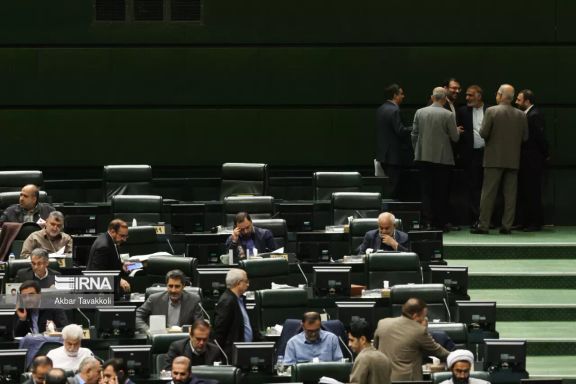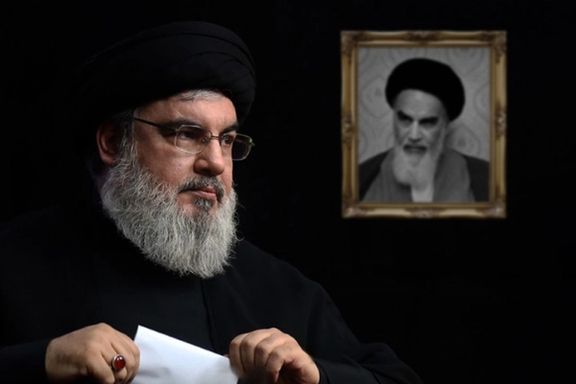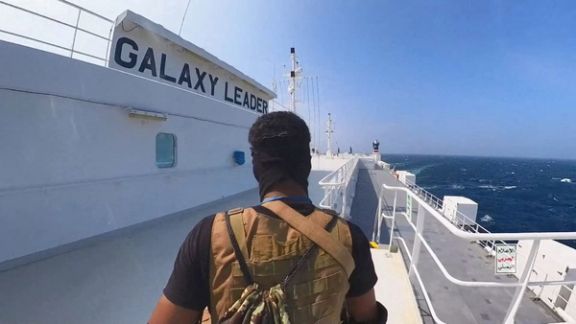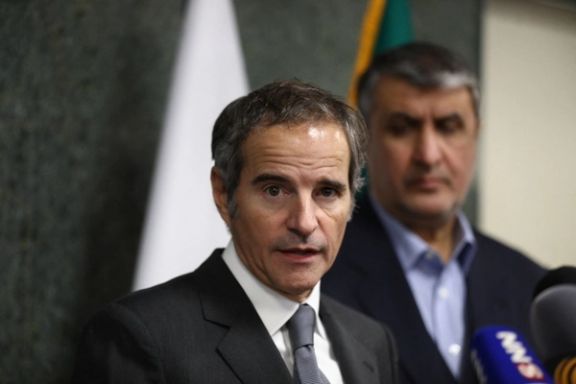Iran's Foreign Minister Meets Hamas Leader In Qatar

Iran's Foreign Minister Hossein Amir-Abdollahian met with Hamas' political bureau head, Ismail Haniyeh, in Qatar on Tuesday amid the ongoing Gaza war.

Iran's Foreign Minister Hossein Amir-Abdollahian met with Hamas' political bureau head, Ismail Haniyeh, in Qatar on Tuesday amid the ongoing Gaza war.
Despite its continued denial of involvement in the October 7 atrocities, which resulted in the death of 1,200 mostly civilians, with over 250 individuals taken hostage to Gaza, Tehran continues its public meetings with Palestinian militant groups, long supported, armed, and trained by Iran.
In Lebanon on Saturday, the foreign minister also met leaders of Palestinian militant groups in addition to its biggest proxy, Hezbollah.
He has been on a whirlwind tour of the region which began Friday. While in Doha, where Gaza militants Hamas has long had one of its foreign outposts, Amir-Abdollahian held separate talks with his Qatari counterpart and the Emir of Qatar.
Qatar marked the final leg of the Iranian diplomat's regional tour. In Syria, Amir-Abdollahian had also met with regime-backed militant leaders, in addition to President Bashar al-Assad.
Since the outbreak of the Gaza war, Israel has been increasing airstrikes on Iranian-backed military targets in Syria, with reports of high-level killings of Iranian military personnel since the outbreak of the conflict.

Documents leaked following the hack of the Iranian parliament’s media arm have uncovered a wide range of Tehran’s strategies to circumvent US sanctions.
The documents revealed the parliament's coordination with designated Iranian entities and individuals to facilitate their trade activities and conceal their identities and connections from international regulatory bodies. The measures include manipulating purchase documents and customs regulations as well as banking incentives and foreign currency supplies to offset the damages incurred due to sanctions.
Uprising till Overthrow, closely affiliated with the Albania-based opposition Mujahideen-e Khalq (MEK) organization, said they breached 600 of the main servers of the parliament, commission, main chamber, parliament assistant, parliament bank, and other servers related to administrative functions, via the Khaneh Mellat News Agency.
Among the vast array of internal communications and confidential documents leaked Tuesday is a 14-page letter that outlines numerous methods of bypassing sanctions and supporting sanctioned individuals and entities discussed in a session of Iran’s Sanctions Counteraction Headquarters held in August 2023.
The confidential letter is signed by Mohammad Mirmohammadi, the Deputy for Economic and Technological Affairs of the Secretariat of the Supreme National Security Council, addressed to Mohsen Rezaei, the Secretary of the Supreme Council of Economic Coordination of the Branches of Government. A copy of the letter was also sent to the heads of the three branches of Iran’s government, namely the president and the chief justice as well as the Parliament Speaker.

The Sanctions Counteraction Headquarters was established in 2018 after the US withdrawal from the JCPOA. Es'haq Jahangiri, the First Vice President of the Rouhani administration, announced the establishment of this headquarters, saying, "In the new conditions, country managers do not have the right to surrender to the conditions and must find solutions for selling oil and providing the country's needs."
According to the leaked letter, the HQ decreed that sanctioned individuals have the "possibility to change their identity for the purpose of continuing their activities." They will also benefit from other facilities such as "financial incentives in banking, insurance, tax, and customs areas."
Another resolution included "provision of protective and security coverage" to all managers, agents, and people working to neutralize sanctions, aimed at "immunizing" them against incurred damages.
Mentioned in the letter is the provision of legal-judicial services domestically and internationally to support people at risk of retribution for their efforts to evade sanctions. Methods of bypassing the restriction to import sanctioned goods and dual-use goods are also addressed, in addition to practices such as not providing a certificate of origin or accepting a mismatched certificate of origin from non-Iranian businesses, tampering with documents with names inconsistent with the buyer, and changing the name or details of the purchase agreement.
Using foreign intermediaries for sanctioned goods was also introduced as a common practice with customs permitted to change declarations to avoid the disclosure of information about the imported goods.
Such mechanisms have, over a number of years, effectively established a hidden financial system that has become an integral part of Iran's economy. The authorities of the Islamic Republic have repeatedly acknowledged their efforts to circumvent US sanctions, and some people in Europe and the US have been detained on charges of involvement in this circumvention.
The timing of the cyberattack is notable as it coincides with the upcoming parliamentary elections, scheduled for March 1st, which have been marred by extensive disqualifications of candidates, raising concerns about the integrity of the electoral process. This isn't the first time Uprising till Overthrow has targeted Iranian government agencies. In June, the group exposed documents from the Iranian presidential system, shedding light on activities of the Revolutionary Guards in suppressing protests.

Iran's Islamic Revolutionary Guard Corps (IRGC) said on Tuesday it has launched long-range ballistic missiles from a warship for the first time.
The announcement came during naval exercises with the IRGC deploying two ballistic missiles from the Shahid Mahdavi warship.
The IRGC claims that the missiles can strike targets up to 1,700 kilometers (1,050 miles) away.
"The IRGC has initiated the firing of ballistic missiles in the Gulf of Oman for the first time," state television reported.
IRGC Chief Hossein Salami stated, "The launch of a long-range ballistic missile from the warship was executed with success."
In a warning on Tuesday, Salami said, "In the event of a naval conflict and our ships being targeted, we will respond with equal or greater force."
Additionally, state television reported that the IRGC conducted a simulation of a surface-to-surface ballistic missile strike on Israel's Palmachim airbase from central Iran. The base serves as a critical facility for F-35 fighter jets in Israel.
The military maneuvers unfold amid heightened regional tensions following the eruption of the Israel-Hamas conflict on October 7. Iran, which does not recognize Israel, has long opposed it and supported Palestinian terror groups since the 1979 Islamic revolution.

The leader of Iran-backed Hezbollah in Lebanon said on Tuesday that his group's cross-border shelling into Israel would only end when Israel's "aggression" on the Gaza Strip stops.
Hassan Nasrallah claimed that diplomatic efforts so far to bring a halt to hostilities along Lebanon's border seemed to only benefit Israel.
Hezbollah has been trading fire with the Israeli military across Lebanon's southern border in support of its Palestinian ally Hamas, since war started on October 7 that was met with heavy Israeli bombardment by land, air and sea.
Nasrallah said his group would only stop its exchanges of fire if a full ceasefire was reached for Gaza.
"On that day, when the shooting stops in Gaza, we will stop the shooting in the south," he said in a televised address.
He said many foreign "delegations" had travelled to Beirut with "proposals" to end hostilities in southern Lebanon, but said they only seemed to "have one goal, which is: the security of Israel, the protection of Israel."
The foreign ministers of France, Britain, and other countries have travelled to Lebanon in recent weeks to bring calm to the border.
France's foreign minister delivered a written proposal to Beirut that calls for Hezbollah's units to withdraw 10 km (6 miles) from the border.
"You read the paper - there's nothing. There's Israel's security," he said.
The cross-border shelling has already killed around 200 people in Lebanon, including more than 170 Hezbollah fighters, as well as 10 Israeli troops and five Israeli civilians. It has also displaced tens of thousands of people in each country.
Nasrallah said residents of northern Israel "will not return" to their homes and threatened that even more would be displaced.

A State Department spokesman told Iran International that the Tehran-backed Houthis' Red Sea blockade not only threatens global food supplies but "now directly threatens even Iran’s own supply of food."
It follows an attack on a bulk carrier of corn traveling from Brazil to Iran on Monday. "This is just the latest, absurd example demonstrating that the Iranian regime supports terrorism and destabilizing behavior by groups like the Houthis at the expense of all the people of the region, including the Iranian people themselves," the spokesperson said.
Citing maritime sources, Reuters reported that the attack was the first time a ship headed for Iran was targeted amidst the Red Sea blockade, launched in November.
A regional security official told Reuters that the attack appeared designed to "show Iran does not control the Houthis and they act independently." They added that the Houthis had informed Tehran in advance, though so far Iranian officials are yet to comment on the allegations or the attack itself.
The Yemeni Houthis joined the proxy war which emerged in the aftermath of Iran-backed Hamas's attack on Israel on October 7. The deadliest day for Jews since the Holocaust, Hamas killed 1,200 mostly civilians and took at least 250 more hostage. Israel's relentless retaliation on the Gaza based militia has led to large swathes of the strip destroyed and around two thirds of the population at least displaced.
In solidarity, Iranian proxies in Iraq, Lebanon, Syria and Yemen have attacked both Israel and US targets, punishment for Biden's support of Israel's right to defend itself in the wake of the October atrocities.

Rafael Grossi, the Director-General of the UN nuclear watchdog said Iran is “not entirely transparent," following worrying remarks by Iran's former nuclear chief, Ali Akbar Salehi.
In a televised interview, Salehi, who was also foreign minister (2010-2013), was asked if Iran has achieved the capability of developing a nuclear bomb. Avoiding a direct answer he stated, "We have [crossed] all the thresholds of nuclear science and technology."
Grossi addressed Salehi's warnings directly on Tuesday at Dubai’s World Government Summit. “There’s loose talk about nuclear weapons more and more, including in Iran recently. A very high official said, in fact, we have everything, it’s disassembled. Well, please let me know what you have,” he said.
To say that Iran is “presenting a face which is not entirely transparent when it comes to its nuclear activities”, as Grossi called it, will come as no surprise to the international community as Iran has repeatedly obstructed inspectors of the IAEA in their work to assess Iran’s nuclear enrichment.
In October, Iran branded IAEA inspectors political "extremists" as it tried to justify its standing in the way of vital work.
The head of the Atomic Energy Organization of Iran (AEOI), Mohammad Eslami, justified Tehran's decision to ban what Grossi said was around one third of the international inspection team, claiming those expelled had a history of "extremist political behavior”.
At the time, Eslami downplayed the scale of the ban, saying instead that it was an "insignificant" number expelled, contradicting the statement by Grossi in which he made a rare public criticism of the regime for its obstructive behavior in September.
An exasperated Grossi said in September: “With today’s decision, Iran has effectively removed about one third of the core group of the Agency’s most experienced inspectors designated for Iran,” adding that the move "affects in a direct and severe way the ability of the IAEA to effectively conduct its inspections in Iran.”
Just days ago, weapons expert David Albright told Iran International: “The transparency of the nuclear program has decreased significantly. Their [Iran’s] nuclear weapons capabilities have grown over the last several years … And it's also a point in time where people's attention is elsewhere. The Iran nuclear issue barely makes the newspapers these days.”
Amid a regional proxy-war led by Iran’s militias around the Middle East, the nuclear issue has taken a back seat as Iran's proxy groups in Iraq, Syria, Lebanon and Yemen have wreaked havoc in the wake of the Hamas invasion of Israel on October 7.
Hamas, the Iran-backed Palestinian group which controls Gaza, killed 1,200 mostly civilians and kidnapped at least 250 more, sparking a conflict with proxies attacking both Israel and US targets around the region.
Speaking of the current geopolitical crisis, Grossi warned: ”Of course this increases dangers.”
Salehi, who served as the head of the civilian Atomic Energy Organization of Iran under then-President Hassan Rouhani, is seen as a relative moderate within Iran and was one of the team who reached the 2015 nuclear deal with world powers.
But with a bubbling war boiling in the Middle East, orchestrated from Tehran, Grossi noted “an accumulation of complexities” is now erupting in the wake of the Gaza war.
In an article entitled ‘How Quickly Could Iran Make Nuclear Weapons Today?’, Albright recently wrote that it could be as little as a week.
“The long pole in the tent of building nuclear weapons is essentially complete,” he said. “Iran can quickly make enough weapon-grade uranium for many nuclear weapons, something it could not do in 2003. Today, it would need only about a week to produce enough for its first nuclear weapon. It could have enough weapon-grade uranium for six weapons in one month, and after five months of producing weapon-grade uranium, it could have enough for twelve.”
The Joint Comprehensive Plan of Action (JCPOA), reached by Iran, China, France, Germany, Russia, the United Kingdom, the US and the European Union, had set out rigorous mechanisms for monitoring restrictions placed on Iran’s nuclear program, while paving the way for the lifting of UN sanctions.
However, as the regime is going full steam ahead, there seems to be neither hope for reviving the agreement which collapsed under the Trump administration, nor hope for Iran’s slowing down.